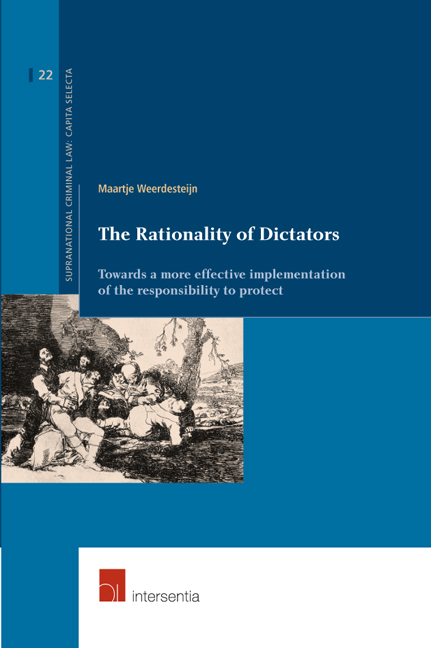 The Rationality of Dictators
The Rationality of Dictators Book contents
- Frontmatter
- Acknowledgements
- Contents
- Chapter 1 Introduction
- Part I The Theory
- Part II The Comparative Case Study
- Chapter 7 Pol Pot and the Destruction of Cambodia
- Chapter 8 Milosevic and the Dissolution of Yugoslavia
- Chapter 9 The Rationality of Pol Pot
- Chapter 10 The Rationality of Milosevic
- Chapter 11 Military Intervention: Lessons Learned from the Wars with NATO and Vietnam
- Chapter 12 Lessons Learned for the Implementation of the Responsibility to Protect
- Chapter 13 Conclusion: A Piece of the Puzzle
- References
Chapter 11 - Military Intervention: Lessons Learned from the Wars with NATO and Vietnam
from Part II - The Comparative Case Study
Published online by Cambridge University Press: 28 September 2018
- Frontmatter
- Acknowledgements
- Contents
- Chapter 1 Introduction
- Part I The Theory
- Part II The Comparative Case Study
- Chapter 7 Pol Pot and the Destruction of Cambodia
- Chapter 8 Milosevic and the Dissolution of Yugoslavia
- Chapter 9 The Rationality of Pol Pot
- Chapter 10 The Rationality of Milosevic
- Chapter 11 Military Intervention: Lessons Learned from the Wars with NATO and Vietnam
- Chapter 12 Lessons Learned for the Implementation of the Responsibility to Protect
- Chapter 13 Conclusion: A Piece of the Puzzle
- References
Summary
INTRODUCTION
In 1979, Pol Pot was confronted with the threat of military intervention when its border conflict with Vietnam spiralled out of control. Twenty years later Milosevic's survival in power was also at stake when NATO was prepared to bomb Milosevic back to the negotiating table. Each of the leaders had to consider whether they were willing to halt their violent policies in the contested areas and whether they were willing to negotiate a more peaceful resolution to the conflicts. Both of the interventions are likely to have saved the lives of numerous individuals but were highly controversial. To a certain extent, both episodes reflected the time in which they were fought; while Vietnam became an international outcast, NATO's intervention was seen as ‘illegal but legitimate’ by the Independent International Commission on Kosovo. The Commission argued: ‘the intervention was justified because all diplomatic avenues had been exhausted and because the intervention had the effect of liberating the majority population of Kosovo from a long period of oppression under Serbian rule’ (The Independent International Commission on Kosovo, 2000, p. 4). In the 1970s, the perpetration of atrocities was never a good reason to infringe upon the sovereign rights of any country, but by the end of the 1990s the international community was torn between the injustice of intervening and the injustice of standing by while innocent civilians are slaughtered. The intervention in Kosovo therefore raised questions about the rightfulness of military intervention for humanitarian purposes and eventually led to the report of the International Commission on Intervention and State Sovereignty in which the responsibility to protect was conceptualised.
Many problems plague military intervention by foreign powers when a regime perpetrates unimaginable atrocities. The dilemma of whether there is a will to intervene, as well as the question whether military intervention should even be considered an option, is discussed extensively elsewhere (e.g. Chomsky, 2012; Power, 2013; Wheeler, 2000). The intention of this chapter is merely to provide an assessment of the possible ways in which different leaders may respond to the threat of, and the actual use of, military force. Scholars have debated the extent to which the decisions of both Milosevic and Pol Pot can be considered rational, considering the military might of the intervening powers and the balance of powers in the international arena.
- Type
- Chapter
- Information
- The Rationality of DictatorsTowards a more effective implementation of the responsibility to protect, pp. 303 - 348Publisher: IntersentiaPrint publication year: 2016


